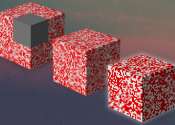Scientists develop aqueous zinc-ion battery with high energy density and ultra-long lifetime
A research team at the Hefei Institutes of Physical Science of the Chinese Academy of Sciences (CAS), led by Prof. Zhao Bangchuan, has developed a high-performance aqueous zinc-ion battery with ultra-long cycle life in a ...
Jun 14, 2023
0
108









